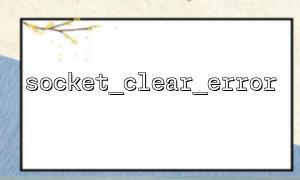In PHP development, the socket_clear_error() function is used to clear error states in socket connections, and is usually used to ensure the correctness of socket state in network communication programs. However, when we use this function in a multithreaded or asynchronous environment, we may encounter some unexpected problems. This article will discuss the causes of these problems in detail and provide corresponding solutions.
socket_clear_error() is a function provided by the PHP Socket extension to clear error status on a socket resource. The typical usage is as follows:
socket_clear_error($socket);
After the call, the error status that occurs before the socket will be cleared, so that subsequent read and write operations will not be affected by old errors.
In multithreaded environments such as using pthreads extensions or asynchronous (such as Swoole or ReactPHP- based), the following situations are more common:
The error state is not cleared correctly : After calling socket_clear_error() , the error state seems to still exist.
Thread/coroutine competition results in state exceptions : multiple threads or coroutines access the same socket at the same time, resulting in the error status being accidentally overwritten or not being cleaned.
The program is stuck or throws an exception after calling : In some environments, calling this function will cause deadlock or undefined behavior.
The core reason for these problems is that socket_clear_error() is not designed as a thread-safe or coroutine-safe function, and the underlying socket state maintenance depends on the process or thread context.
Shared resource conflict <br> In a multi-threaded environment, multiple threads operate on the same socket and do not have an appropriate synchronization mechanism, resulting in the call to socket_clear_error() that may read an old error, or be disturbed by other threads during cleaning.
Context switch in asynchronous environment <br> Asynchronous frameworks such as Swoole, switch between coroutines frequently and socket error status may not be updated immediately, resulting in the call to socket_clear_error() not working.
Low-level implementation restrictions
PHP's own socket extension encapsulation of underlying system calls may not be suitable for complex asynchronous or multithreaded scenarios, and may cause state information to be out of sync.
The most fundamental solution is to avoid multiple threads or coroutines sharing the same socket directly, and instead maintain independent socket connections for each thread/coroutine.
// Example:Each thread creates its ownsocketconnect
$socket = socket_create(AF_INET, SOCK_STREAM, SOL_TCP);
socket_connect($socket, 'm66.net', 80);
// In this thread/Used in coroutinessocket,Callsocket_clear_errorIt will not affect other threads
socket_clear_error($socket);
If you must share sockets, be sure to use mutex to protect the operations on sockets and error status to prevent race conditions.
$mutex = new Mutex(); // Assume that there is mutex support
$mutex->lock();
socket_clear_error($socket);
$mutex->unlock();
In an asynchronous environment, it is recommended to use the socket operation API that comes with asynchronous frameworks (such as Swoole), which optimize coroutines and event loops.
// SwooleExample,Using coroutinesSocket,Automatically manage error status
$socket = new Swoole\Coroutine\Socket(AF_INET, SOCK_STREAM, 0);
$socket->connect('m66.net', 80);
// 直接Call框架方法管理connect和错误
$socket->clearError();
Avoid frequent cleaning of errors by relying on socket_clear_error() , but adopt a more robust error detection and reconnection mechanism. For example:
In the event of an error, actively close and rebuild the socket.
Respond to network exceptions in a timely manner through exception capture and log monitoring.
socket_clear_error() works well in single thread synchronization scenarios, but has security and consistency problems when used in multi-threaded or asynchronous environments. To ensure the stability of the program, developers should avoid socket sharing, use lock mechanisms, rely on the asynchronous framework's own API, or replace the practice of simply cleaning up error states by improving error handling logic.
In this way, the robustness and efficiency of network communication can be ensured in a complex concurrent environment.













